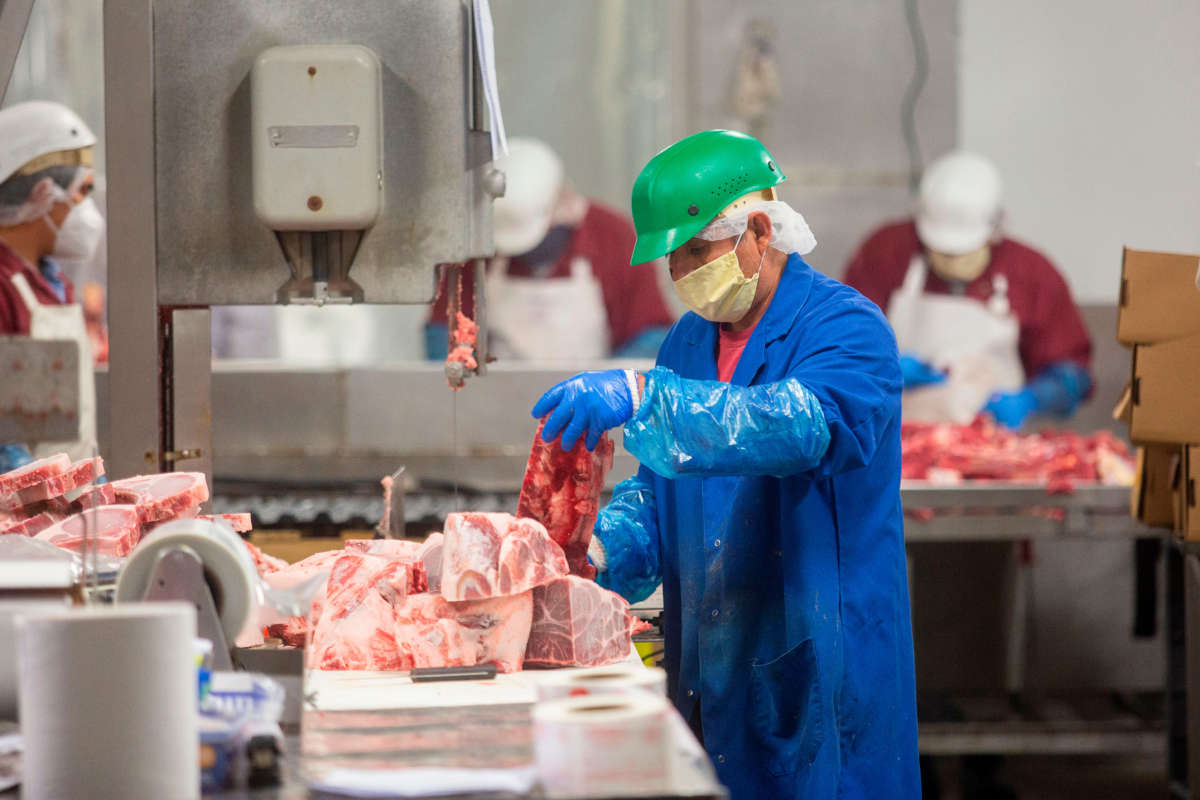President Donald Trump issued an executive order in late April requiring all meat processing plants in the U.S. to remain open, despite reports of coronavirus infections and related deaths being prevalent at a number of the plants.
Since that order was issued, the number of COVID-19 cases that have been identified at meat plants across the country has likely tripled, according to estimates from a nonprofit watchdog group.
At the time of Trump’s executive order, the Centers for Disease Control and Prevention (CDC) had identified around 5,000 employees across 20 meat processing plants who had contracted COVID-19, and 17 workers at those plants who had died from the disease. In spite of concerns about the disease spreading at these and other locations, the president issued his order, utilizing the Defense Production Act to classify processing plants as essential infrastructure.
The order from Trump came about two days after Tyson Foods, one of the largest meatpacking companies in the country, suggested stay-at-home orders were threatening the nation’s food supply chain.
The executive order prevented local governments and health officials from enforcing plant closures in the event of an outbreak and it’s now apparent that the disease has indeed spread at these meatpacking locations since the order.
More than 100 plants across the country have seen a high number of cases of COVID-19. The Food & Environment Reporting Network (FERN), a nonprofit journalism watchdog group dedicated to food and agricultural issues, estimated in a report published last week that 17,000 workers may have now contracted the disease, with at least 66 COVID-related deaths recorded among employees at meat processing plants.
In light of this, other organizations are demanding the federal government take a more proactive approach toward limiting the spread of COVID-19. Citing the large numbers of workers at meat processing plants contracting coronavirus, the Center for Food Safety produced a petition in which it demanded the U.S. Department of Labor’s Occupational Safety and Health Administration (OSHA) issue new emergency standards to protect employees’ health.
“Protecting workers in meatpacking plants is important not just for the workers, but also for our food safety,” the organization wrote in its letter. “Unprotected and sick workers are more likely to make mistakes, making it more likely that tainted meat gets onto store shelves. The last thing we need during this pandemic is a major foodborne illness outbreak.”
There are a number of reasons why meatpacking plants could be hotbeds for COVID-19. Workers typically stand close together, often shoulder-to-shoulder, on the assembly line. Many workers aren’t wearing protective gear at this time either, as it slows down their pace of work, while the companies themselves have admitted to struggling to find the necessary protective equipment for their workers, even after Trump’s executive order was issued.
Colder temperatures in the plants may also be helping the virus linger longer on surfaces or in air particles, and ventilation systems may be spreading coronavirus throughout the buildings.
Among the U.S. population in general, it’s feared that coronavirus will likely continue to spread even more than it already has, as several states begin transitioning away from stay-at-home orders that were previously issued.
As of Tuesday this week, the nation surpassed 100,000 deaths from COVID-19, and one estimate forecasts that 30,000 more Americans could die from the disease by Independence Day. Many health experts agree that a second wave of cases is likely to come about as states reopen businesses and other public areas.
Join us in defending the truth before it’s too late
The future of independent journalism is uncertain, and the consequences of losing it are too grave to ignore. To ensure Truthout remains safe, strong, and free, we need to raise $46,000 in the next 7 days. Every dollar raised goes directly toward the costs of producing news you can trust.
Please give what you can — because by supporting us with a tax-deductible donation, you’re not just preserving a source of news, you’re helping to safeguard what’s left of our democracy.
